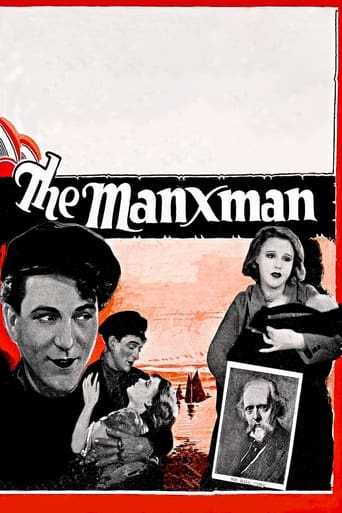

Let's be realistic.
... View MoreFantastic!
... View MoreThere's a more than satisfactory amount of boom-boom in the movie's trim running time.
... View MoreIt's simply great fun, a winsome film and an occasionally over-the-top luxury fantasy that never flags.
... View MoreYet another turgid silent film about unfaithful friends and lovers. To financially support the woman he loves, a fisherman travels to Africa, the two promising to remain faithful until he returns. However the fisherman's lawyer friend also loves the woman, and while the fisherman is away, the lawyer and the woman become a couple. When the undead fisherman unexpectedly returns, the woman who promised to remain faithful to him must marry, but is deeply unhappy, as is the lawyer. Being a Hitchcock film, the only surprising thing about this love triangle is that it doesn't end in murder. With a lawyer involved, I guess I should've seen the courtroom finale coming! This storyline is all very pointed and obvious, and much of the acting is over the top horrendous. As you would expect however, mostly thanks to noir lighting, Hitchcock does manage to infuse some moodiness and tension and his talent is noticeable - just don't come for the story.
... View MoreFor a silent film, it is pretty good. If a drama can make you consider moving to the edge of your seat, it must have a somewhat compelling story. This film is definitely imperfect; one of the main characters is just dense, to the extent that you can't help but roll your eyes at times. Nevertheless, I found myself on multiple occasions becoming genuinely engaged, interested in the fate of the characters, and even impatiently anticipating the outcome of different events throughout the story. Not a movie I am looking forward to watching again (there wasn't anything to make it really exceptional or unforgettable), but it wasn't bad either, especially considering how old it is.
... View MoreThe great film critic Roger Ebert coined the phrase "the idiot plot" in connection with movies that depend on idiotic behavior by their main characters in order to work at all. Here's proof of the concept in action long before Ebert came along to christen it.Bosom buddies Pete (Carl Brisson) and Philip (Malcolm Keen) follow different career paths on the Isle of Man; Pete fishes and Philip practices law. Pete falls in love with the barkeeper's daughter, pretty Kate (Anny Ondra) and asks Philip to look after her while he goes off to make his fortune. Philip looks after her alright, enough to be worried at news of Pete's return.The idiot plot, in this instance, is the fact that Pete and Kate aren't exactly lovers even before he leaves; director Alfred Hitchcock clues us in early to the fact Kate wants Philip and vice versa. Why then the hang-up about her pairing off with Philip? Philip himself says something about Pete's "faith in our loyalty," but it seems a thin idea to build a story around.An idiot plot alone isn't enough to condemn a film; looked at rationally it could be said "The Searchers" and Hitchcock's own "Vertigo" have them, too, and I think they're swell anyway. Here, however, the idiot plot is in service of a slow-moving film rife with unintentional comedy and two performances (Keen's and Ondra's) which are cringingly bad. You can't help noticing the characters acting stupidly when there's nothing much of quality to distract you.The only arresting element to this whole film, other than the fact it represents Hitchcock's final silent feature (he made some good ones, but really needed sound to find himself), is the cinematography by Jack E. Cox, which calls attention to itself from the opening shot of fishing boats sailing into port amid a strikingly craggy shoreline. Each outdoor shot grants you a new perspective at this offbeat location from this distant time.Whenever this film is inside, it is a real tooth-pull. Hitchcock favors long shots of the actors staring into the camera, eyes darting back and forth to indicate hidden secrets. Kate flounces about in a state of perpetual minxhood, seemingly unable to control her desire for Phil even if it means abandoning her baby to set up residency in Phil's closet. Phil could have been interesting if he was played as a bit of a louse, but instead Keen gives us a series of pained looks to indicate how aggrieved he is by the whole thing. He looks instead like a used-car salesman.There's a funny moment where Phil and Kate first get it on inside a mill, in which the camera decorously cuts to a grinding millstone after they embrace. Hello, train tunnel. But it gets rather ridiculous when Kate and Pete hold their reception in the same room, and Kate's Bible- thumping Dad somehow decides to use that same grindstone as an object lesson against backsliding and adultery."The mills of God grind slowly..." he warns, as Kate and Phil shrink in fear.The mills of Hitch grind slowly indeed in this film, all because Phil is too much of an idiot to tell his buddy the truth. If you want to see a solid example of Hitchcock before he really found himself, give this a look; if you want classic silent entertainment, look elsewhere.
... View MoreThe "Manxman" in the title refers to a person from the Isle of Man--an independent part of the British Crown but technically not part of the United Kingdom. This large island is located between Britain and Ireland and actually produces its own money and has its own particular language (though English is commonly spoken). Outside the UK, I doubt if that man people are familiar with this place or would recognize the three-legged symbol (the "triskelion") on its flag. Just a bit of history to put the whole thing in perspective. Plus, it's the only film I can recall having seen that's set on this island.The film begins with two friends living on the island. Pete is a poor fisherman and Philip is from a well to do family. They both are in love with the same girl, though because Philip is such a nice guy, he stands aside and says nothing. However, the girl's father won't have Pete for a son-in-law because he's so poor, so Philip goes off to sea to earn his fortune. Unfortunately, word soon comes to everything that Pete has died, so Philip announces to the girl that he loves her. Coincidentally, it turns out she always loved Philip as well, so they plan on marrying. Then, out of the blue, Pete returns--he didn't die while at sea after all. The first thing he does is ask the girl again to be his bride. Heartbroken but feeling responsible since Pete asked her first, she agrees. Unfortunately, unknown to her and Philip is that she is carrying Philip's baby!! Yikes.Well, after the baby is born, apparently Pete couldn't figure out that the kid was his and Philip moves to England to start life anew. However, soon she follows him--leaving poor Pete stuck at home with the kid. What a mess, but in spite of this Pete keeps up a brave face and tells everyone she's on holiday. Later, he comes to see Philip to ask him to help find his wife--little did he know that she was with his best friend all along.If you think about it, this plot is very much like a soap opera and is nothing like the films for which Hitchcock became well-known. As far as the film goes, it is pretty interesting but the plot suffers from one problem. When Pete returned from sea, had they just told him the truth--that they fell in love AFTER they heard he was dead--then the whole mess could have been avoided. Sure, Pete would have been upset but would have no doubt understood. However, aside from this obvious solution, it's a pretty interesting film and is well made, though a tad predictable. As far as the acting goes, it's pretty good for a silent--without an serious over-emoting.By the way, Hitchcock's next film (also 1929) turned out to be Britain's first sound film. While this was well behind the US move to sound, it was still early compared to the rest of the world.
... View More